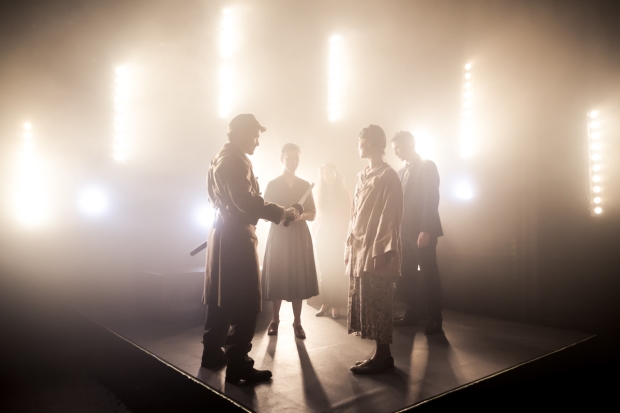Review: Into The Numbers (Finborough Theatre)
Christopher Chen’s play has its UK premiere at the west London venue.

© Scott Rylander
How do we begin to comprehend the enormity of genocide? Christopher Chen’s intimate dream-play wonders whether we even can. Using the case of Iris Chang, the American historian who took her own life after writing a bestselling account of the 1937 Nanking massacre, he attempts to offset the scale of such an atrocity against the absolutism of any single individual’s death. It is, at times, impossible to reconcile the two.
When Japanese soldiers stormed the city of Nanking (now Nanjing) during the Second Sino-Japanese War, they unleashed horror on its population. Chang’s book describes a rampage, ordered by Japanese generals, that left 300,000 dead in less than six weeks. At a literary event, the historian grapples with that figure, comparing it to the scale of similar atrocities, but also measuring the mileage of the body count and the tonnage of the blood spilt. In the middle of that massacre are countless individual horrors: victims ripped apart by dogs and strung up by their genitals; thousands of women raped and desecrated; babies bayoneted in mid-air for sport. The last phrase recurs, as if Chang can’t shake the image from her mind.
As it slips from that civil Q&A into a psychiatrist’s office, Into the Numbers questions the toll Chang’s research takes on her mental health, almost asking whether she could rank among Nanking’s victims herself. When, Chen wonders, does an atrocity come to a close? Its tendrils seem to reach through history, and Chang herself becomes fixated on Japan’s failure to fully acknowledge or apologise for its actions. Not only does it impinge on her personal life, Nanking itself becomes personal. Deteriorating, Chang hallucinates a number of its figures: a Japanese soldier scything the air with his sword and an American expat Minnie Vautrin, who saved hundreds at Nanking only to commit suicide on returning home.
Chen’s work often fixes its gaze on the interplay of historical fact and fiction. His latest play, Caught, imagines a dissident Chinese artist who elaborates on his account of detention to draw attention to the very real issue of China’s political prisoners. Chang’s story is similar, and Chen focuses on the moments she must start making it up – if not in her actual words, then at least in her mind’s eye.
At some level, all history is speculative fiction.
However, it’s hard to shake the sense that Chen himself is guilty of the same thing. Not only does he dwell on the details of the Nanking massacre, the very thing he supposes caused Chang’s mental deterioration, he also ends up speculating about the nature of her psychological disarray and the causes of her suicide. Call it self-awareness if you will, but it feels hypocritical nonetheless.
Regardless, both make for meaty subjects to chew on – the unknowability of both genocide and suicide – and Chen asks whether any equivalence exists between them. Into the Numbers works best as a theatrical essay, though that’s partly because its chosen situations – the literary interview and the psychiatrist’s chair – are so standard issue, they seem somewhat inert.
The same goes for the slippage in scenes to show Chang’s breakdown. Georgie Staight’s production handles the transitions smoothly – massively helped by Timothy Knightley’s unfussy switches between Chang’s psychiatrist, husband and interviewer – but it never achieves the dizzying feeling of mental disarray. Too often, Elizabeth Chan plays the historian’s disorientation from the outside, showing us the symptoms of madness without following the thought patterns. It risks turning what might be a null state, a depressive void, into a hackneyed hysterical one – and that’s as speculative as anything Chang herself put down.
Into the Numbers runs at the Finborough until 27 January.

















